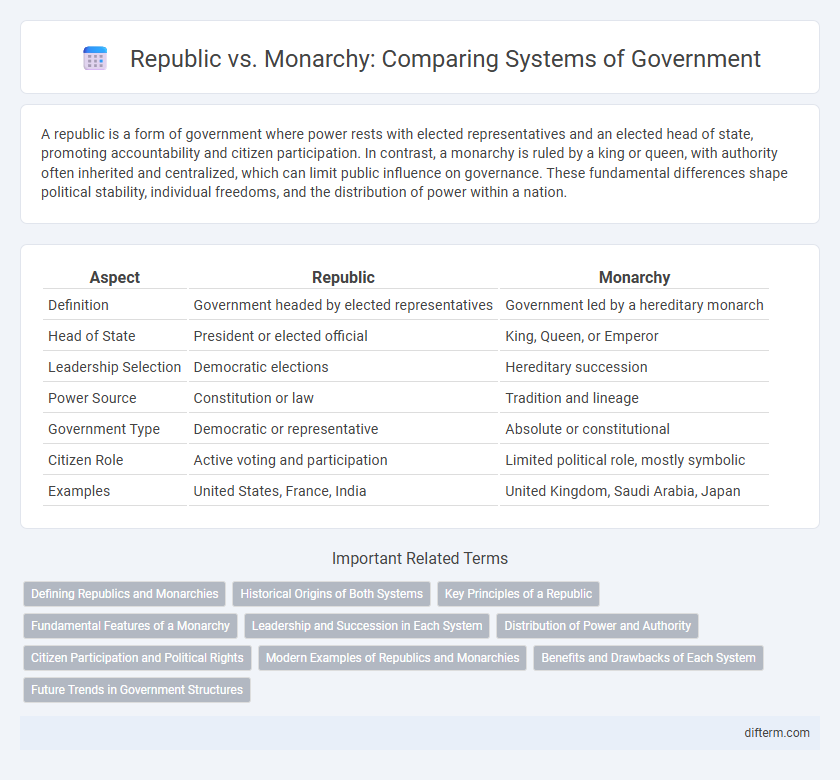A republic is a form of government where power rests with elected representatives and an elected head of state, promoting accountability and citizen participation. In contrast, a monarchy is ruled by a king or queen, with authority often inherited and centralized, which can limit public influence on governance. These fundamental differences shape political stability, individual freedoms, and the distribution of power within a nation.
Table of Comparison
| Aspect | Republic | Monarchy |
|---|---|---|
| Definition | Government headed by elected representatives | Government led by a hereditary monarch |
| Head of State | President or elected official | King, Queen, or Emperor |
| Leadership Selection | Democratic elections | Hereditary succession |
| Power Source | Constitution or law | Tradition and lineage |
| Government Type | Democratic or representative | Absolute or constitutional |
| Citizen Role | Active voting and participation | Limited political role, mostly symbolic |
| Examples | United States, France, India | United Kingdom, Saudi Arabia, Japan |
Defining Republics and Monarchies
Republics are political systems where the head of state is elected or appointed, often emphasizing citizen participation and rule of law, with power typically residing in elected representatives and governance based on constitutional frameworks. Monarchies feature a hereditary sovereign, such as a king or queen, who usually holds authority for life, with varying degrees of power depending on whether the monarchy is absolute or constitutional. Defining republics and monarchies involves distinguishing between the source of legitimacy--electoral mandate in republics versus dynastic succession in monarchies--and the structure of political authority within their respective governmental institutions.
Historical Origins of Both Systems
Republics originated from ancient Rome's model of representative governance, emphasizing elected officials and citizen participation in political decision-making. Monarchies trace back to early human societies where centralized authority was vested in a single sovereign, often justified by divine right or hereditary succession. Both systems shaped political evolution, with republics advancing democratic principles and monarchies establishing long-standing dynastic rule.
Key Principles of a Republic
A republic is defined by the principle of popular sovereignty, where the authority of the government is derived from the consent of the governed, contrasting with a monarchy's hereditary rule. This system emphasizes elected representatives who are accountable to the citizens, ensuring that laws reflect the collective will rather than the interests of a single ruler. Rule of law and constitutionalism are foundational, limiting government power and protecting individual rights within a republic's framework.
Fundamental Features of a Monarchy
A monarchy is characterized by a single ruler, often a king or queen, who holds supreme authority typically inherited through a royal lineage. The monarch's power is usually lifelong and centralized, with legitimacy often rooted in tradition, religion, or historical precedent. Unlike republics, monarchies may combine ceremonial roles with political control, influencing governance, legislation, and national identity.
Leadership and Succession in Each System
Republic leadership is typically determined through elections where citizens vote for representatives or heads of state, ensuring leadership accountability and limited terms. In contrast, monarchy leadership is usually hereditary, passed down within a royal family, often for life, providing continuity but less flexibility in leadership change. Succession in republics follows legal and constitutional procedures, while monarchies rely on established bloodlines or dynastic rules for the transfer of power.
Distribution of Power and Authority
In a republic, power and authority are distributed among elected representatives and institutions, ensuring accountability and preventing concentration of control. Monarchies concentrate power in a hereditary ruler, often accompanied by a council or parliament with limited authority. The distinction hinges on whether governance is based on popular sovereignty or dynastic rule, affecting the balance and checks on political power.
Citizen Participation and Political Rights
Republics emphasize citizen participation and political rights by enabling voting, free speech, and representation through elected officials, ensuring government accountability. Monarchies often limit political rights, concentrating power in a hereditary ruler, which restricts broad citizen involvement in decision-making processes. Democratic republics prioritize legal frameworks that protect individual freedoms and promote equal political engagement, contrasting with monarchic systems where such rights may be symbolic or absent.
Modern Examples of Republics and Monarchies
Modern republics such as the United States, France, and India operate under elected leadership with a constitution that ensures separation of powers and citizens' voting rights. Contemporary monarchies like the United Kingdom, Sweden, and Japan feature constitutional monarchs whose roles are largely ceremonial, with real political power vested in elected parliaments. Both systems exemplify governance models balancing tradition and democratic principles in the 21st century.
Benefits and Drawbacks of Each System
Republics foster representation through elected officials, enhancing accountability and public participation, but they can face challenges like political gridlock and short-term policy focus. Monarchies provide stability and continuity with a single hereditary ruler, often uniting a nation culturally, yet they risk authoritarianism and limited political freedoms without citizen input. Both systems influence governance effectiveness and citizen rights based on their structural dynamics and historical context.
Future Trends in Government Structures
Emerging trends indicate a gradual shift towards hybrid government structures combining elements of republics and constitutional monarchies, designed to enhance political stability and citizen participation. Advances in digital governance and AI-driven policy-making tools are fostering more transparent and responsive republic models, while some monarchies increasingly adopt democratic reforms to maintain relevance. Future government systems are expected to prioritize adaptability, blending traditional authority with technological innovations to meet evolving societal demands.
Republic vs Monarchy Infographic

 difterm.com
difterm.com